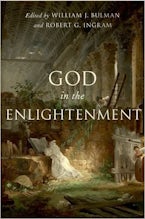- Home
- German Jewish Cultures
- business & economics
- history
- The Jewish Economic Elite

The Jewish Economic Elite
Making Modern Europe
By: Cornelia Aust
Series: German Jewish Cultures
272 Pages
- Paperback
- ISBN: 9780253032164
- Published By: Indiana University Press
- Published: February 2018
$30.00
Economic history poses an interesting disciplinary challenge to the field of religious studies. The challenge is to articulate whether and in what way religion matters to the kinds of stories that economic history typically tells: the rise and fall of particular trades, industries, and regions; the machinations of states and corporations in conflict and competition; the toil of ordinary people earning their livelihoods. Much of the time, it simply does not seem necessary to mention religion in the telling of such stories, as in the apocryphal interaction between Napoleon and the astronomer Pierre-Simon Laplace. Presented with a copy of Laplace’s Celestial Mechanics, Napoleon is said to have remarked to the scientist that he had heard there was no mention of the Creator in the whole massive work. Laplace responded: “I had no need of that hypothesis.”
It may well be that an economic historian has no need to take account of religion. But often enough, economic historians seem to want to, and when they do the results can be fascinating. Cornelia Aust’s The Jewish Economic Elite: Making Modern Europe is a case study in the challenges and contradictions of this intersection. In one sense, this book is hardly about Judaism at all. It takes Jews as its subjects, of course, but then spends most of its time making a very focused argument very effectively. That argument is that a Jewish mercantile elite developed in central and eastern Europe in the late 18th and early 19th centuries, helped along by “occupational flexibility, a willingness to take entrepreneurial risk, and migration” (xv). This new elite was brought about by new conditions, forming a kind of “missing link” between the high-profile Court Jews of the 17th and early 18th centuries and the Rothschild banking house of the 19th century (although Aust is careful to note that the three phenomena are not actually related in any linear fashion). The geographical locus of the book moves east from Amsterdam, with each chapter being named after a slightly more eastern point on the map (Frankfurt an der Oder, Borderlands, Praga, and Warsaw). The ostensibly non-“religious” focus of the book becomes clear early on, when Aust writes that “close commercial and especially familial ties between Ashkenazic and Sephardic merchants were rare, even in Amsterdam. Thus, it seems legitimate to give preference to the term ethnic over religious to describe these networks” (18). The importance of trust in trade networks, and thus the possible relevance of cultural ties in establishing them, is a prominent theme of recent economic history; Aust here means to make a point in that context, but it raises other questions for those who approach the topic from an interest in religion.
In another sense, however, religion is everywhere in this book. The social and political restrictions faced by Aust’s protagonists are imposed by Christian authorities and justified on the basis of Christianity. The marriage ties her protagonists pursue are shaped by halakha as well as by considerations of finance and prudence. Aust also returns several times to the theme of Haskala, or the Jewish enlightenment, exploring the extent to which her merchant protagonists were sponsors or opponents of the movement. She also delves into the outsized impact of this tiny elite on internal Jewish community politics, which were predominantly oligarchic in structure. With each one of these topics, however, the question always lurks: Is it Judaism that matters here, or simply ethnic minority status and geographical dispersion? Do family ties and the solidarity of an oppressed group express themselves as “religious” difference, and should they be analyzed in that way? In some of the trades her protagonists enter (such as army supplying in central Europe and leaseholding for Polish magnates), there is a Jewish specialization in the field thanks to what we might call “ethnic” circumstances. In others, such as banking, the elite she discusses is actually dwarfed by Christian competition in the same field. “Religion” is mentioned in specific subsections on who became a Hasid after the rise of Hasidism, or who converted to Christianity. Ultimately though, the place of Judaism in the story—let alone of any specific Jewish teachings on economic matters that would affect Aust’s protagonists—is unsettled and unclear.
That, however, is a feature of the discipline itself, and is by no means a flaw in Aust’s detailed, insightful, and readable account of an important chapter in Jewish history. I mention it only because it is a disciplinary question that Reading Religion readers may find thought-provoking. Aust’s meticulous research will hopefully lead not only to further developments in economic history along the lines she has laid down, but to deeper thinking across religious studies, among historians, ethicists, theologians, and anthropologists or sociologists of religion.
Samuel Hayim Brody is Assistant Professor of Religious Studies at the University of Kansas.
Samuel BrodyDate Of Review:August 19, 2018
Cornelia Aust specializes in the history of Jewish communities in Poland and German speaking lands from the seventeenth to the nineteenth century at the Leibniz Institute of European History in Mainz, Germany.








